'Founder Mode' hit Silicon Valley last September like a mini tremor in a fault riddled landscape. You know, the place where San Andreas teeters on the edge... Never quite taking the whole show down - but always there, hanging over the existing status quo. Threatening its very existence. In this case, threatening the essence of traditional management theory.
And it awoke something within our Mothership . After all, we are founders, we've worked with founders and backed founders - and we were one of the early ones to do it. You could argue that 'Founder Mode' is our only mode. We have called it other things, and we have been talking about, writing and developing what is now thought of as 'Founder Mode' for decades... Maybe longer. As a result, we thought it might be time to extend the concept of Founder Mode. You know, take it on a bit - like a jackhammer to the fault line.

Founder Mode is a bigger deal than a few scant searches and a couple of notes might reveal. The term itself was first coined by Paul Graham from Y Combinator. He described a talk by the founder of Airbnb, Brian Chesky, who described getting bad advice from VC's and corporate managers about how to scale his startup. Even business schools seem bereft of management techniques for founders of fast growing, often tech-enabled startups.
Paul Graham's defining article on Founder Mode dug into how founders struggled with traditional school of thought which stated that you should scale your startup by hiring great senior managers (often from large corporations) then leaving them alone to build, manage and lead their function. 8-10 such corporate leaders should be able to run the business for you. Hey, you might even hire a COO to manage them! Except, it seemed, they don't.
Similar sentiments were expressed across the Valley and beyond by founder after founder. And this, following a legion of techniques, systems and training around Manager Mode, first developed during the industrial revolution, by academics, thought leaders and corporate managers. Today 'Manager Mode' is the system, the institution, the accepted norm. Founder Mode versus Manager Mode feels like a very young David versus one massive Goliath. Like Nigel Farage against Elon Musk.
Even Steve Jobs stumbled on the 'Manager Mode' curse. He ended up getting booted out of Apple by his leading corporate manager when Apple was experiencing some scaling challenges. Indeed, the stark differences between Manager Mode and Founder Mode were best revealed by John Sculley (Manager Mode) and Steve Jobs (Founder Mode). Steve Jobs was a product genius, but also a highly instinctive and effective Founder. When he returned to Apple in the 1990's he showed us all how 'Founder Mode' should be done. He had learned his lesson.
But, there have been equally effective founders before him - check Thomas Edison, Walt Disney and Enzo Ferrari. Thomas Edison was an inventor, Walt Disney a cartoonist and animation film producer. Enzo Ferrari was a racing car driver, turned racing car designer and maker. And they all had one thing in common - Founder Mode.

Founder Mode is comparable to 'parent mode' - there is no manual, each child is different, and they grow in their own different ways. The optimal way to bring up a child is to be hands on and deeply involved in their early, first-start (startup?) years. Parents seem to somehow know best and they have a powerful natural instinct for their children's safety, development and health. Like Imelda Marcos and her passion for shoes, except with kids.
But to be a successful parent you have to be a great parent. You have to stay the course and be always on for your child, putting the kid first. Founder Mode is no different. To be a successful founder you have to be a great founder and not just any old founder. You have to stay the course and be always on, putting your startup first. You have to keep shaping and building your product until it breaks through in its market, and you have to know your key customers better than anyone. You have to build a great scaled-up company and a culture where your team is your family.
Founders need to stay nurturing their product and market for as long as they physically can. Deep in the weeds. They should remain hands-on - developing circles of expertise and trusted partners around them. They should manage from the middle, not from some arbitrary office up above with a bunch of corporate yes folk surrounding them (and often failing them).
Structures should remain flat - no hierarchical pyramids. Founders are like a senior trader on a trading floor, with specialist teams around them, and their eyes and fingers on the pulse of any key trade or major moves in the market. Corporate Managers should learn 'Founder Mode' before ever joining a startup or scale-up.
And this trend toward 'Founder Mode' might explain the inexplicable rise of Donald Trump and the coterie of tech titan founders that he is surrounding himself with - just waiting to smash big government like a founder!.
AI and increased automation make Founder Mode more possible than ever. After all, teams can stay small for much longer. A billion dollar company could have less than 20 people - maybe even less than 10 people. Perhaps this is Founder Mode. Perhaps this is the future.
Our Mothership wrote a book about it called 'The Size Zero Handbook'. They plan to serialise aspects of it as they develop a management theory and a set of practices for 'Founder Mode'. We thought you should know. And we welcome anyone who can share their experiences with 'Founder Mode' versus 'Manager Mode'.
In Part 2, coming next Month, we will explore how 'Founder Mode' is developing. Stay tuned - 2025 might usher in a whole new founder led world. God save us!
This post first appeared at The Letts Journal.

As we approach the end of an incredible 2024, it’s the perfect moment to reflect on LettsArt’s journey. This year has been nothing short of transformative, marked by innovation, growth, and connection. Here are six key themes that defined our year:
This year, we achieved unprecedented growth, with the number of online art galleries built using LettsArt surging from less than 100 at the end of 2023 to nearly 800 today. Similarly, the number of artworks hosted on galleries using LettsArt grew to over 3,000. The art industry is starting to pay attention to our more advanced users building expansive, fully featured, new generation galleries. LettsArt's phenomenal expansion underscores the trust and enthusiasm of artists, gallerists, and collectors in the LettsArt platform.
LettsArt introduced several cutting-edge product updates designed to empower artists. From enhanced Art Intelligence (AI) features for creating digital galleries to improved collector engagement tools, our software now offers even more ways for artists and gallerists to showcase their work and build meaningful relationships with their audiences. New features in 2024 included extended support for all art types, multi visual assets for each artwork, text-to-image art creation for digital sketching, modelling and more, usability enhancements, and lately the migration of galleries to a new Web3 platform readying for auto-distribution of art on sale from your LettsArt dashboard to 3rd party digital art marketplaces in 2025. And to get new users up and running faster we created a comprehensive Getting Started Guide.

Building stronger connections between artists and collectors remained a central focus this year. Through our blog and new product features, we emphasised the value of direct engagement and building an active following, fostering a vibrant and interactive community. Indeed many of LettsArt's features drive this and help manage it for you. Our efforts have resulted in deeper relationships and increased support for artists, enabling them to thrive in today’s digital art landscape.
We’ve been proud to expand our network of emerging and independent art professionals using our software across the UK, adding galleries from key regions such as Manchester, Liverpool, Glasgow, Bristol, Devon, Cornwall, and many more. This focus on regional art scenes not only enriches our platform but also provides diverse opportunities for artists and collectors to discover and connect with unique artistic voices.

Through our blogs and articles, LettsArt has positioned itself as a thought leader in the online art industry. Topics ranged from fighting the talent drain crisis to building trust and transparency and the hidden art market . These insights have inspired thousands of users and solidified LettsArt as a go-to resource for navigating the ever-evolving art market.
Community-building was at the heart of everything we did this year. With new Featured Galleries and Featured Art sections we’ve brought together artists, gallerists, and collectors in new and exciting ways. We also kicked off an "Artist in Focus" series ( see the latest on Soft Wasp ) to share interesting artists using LettsArt. The LettsArt community has grown stronger and more connected, with countless success stories emerging from these collaborations. We aim to do even more of this in 2025.

As we look to the future, LettsArt remains committed to driving innovation and growth with its software and emerging community of users, while staying true to our mission of empowering artists and independent gallerists and connecting them with passionate collectors - helping to sell art better. With exciting plans already in motion, we can’t wait to see what the next year will bring.
Thank you to everyone who made this year extraordinary. Here’s to another year of creativity, connection, and inspiration!
In 2024, LettsSafari worked hard to promote rewilding and biodiversity restoration. Our efforts encompassed expanding our rewilding initiatives, engaging our community through educational projects and content, and participating in global environmental movements. And, of course, we were never happier than doing the work on the ground in our very own LettsSafari parks.
Our rewilding safari parks have been developing well, and are making quite an impact. The parks are carefully designed to restore natural habitats, support diverse wildlife populations, and combat climate change. We emphasise a collaborative approach, encouraging public participation in building the parks both physically and with LettsSafari subscriptions that fund tree planting, animal introductions, habitat development and brand new rewilding safari parks.
For every 10 subscribers we plant a 5 year old, naturally grown tree annually, every hundred subscribers support the introduction of new wild animals each year and every 10,000 subscribers we add a whole new safari park a year.

This year we planted more than thirty 5 year old trees across our parks - all grown naturally in LettsSafari's Capability Brown gardens. We created habitats for yet more diverse bird life with our extended waterways and further growth of natural hedgerows. This was the first year that we heard Nightingale in our parks and, at the same time, our birds of prey kept adding to their numbers. Our efforts to protect a resident herd of black fallow deer has been very successful.

One of our network of rewilding safari parks, Hill Crest , sent us their year end update: "All is well here in Devon's wildlands with the Pine Martens released back into our landscape, fledging barn owls and two more sites coming on board this winter, things are coming along nicely." They reminded us of the great words of Dr Seuss, "Unless someone like you cares a whole awful lot, nothing is going to get better. It's not."
Through our direct initiatives, the wider LettsSafari network of parks , our subscribers and our digital outreach, we have inspired hundreds of new rewilding parks and gardens in 2024. We know it because you tell us. Many in southwest England but also now a growing number across the country and even further afield.
Throughout the year, LettsSafari has provided valuable resources to educate the public on rewilding practices. Our "Creating Your Very Own Safari Garden" series offers practical advice for individuals to transform their gardens into wildlife havens, promoting urban biodiversity. Additionally, we've highlighted the importance of participating in initiatives like "No Mow May," encouraging people to let their lawns grow to support pollinators and other wildlife.

In celebration of Earth Day 2024, LettsSafari emphasised the significance of combating plastic pollution and embracing nature restoration. We provided guidance on how individuals can contribute to these efforts, reinforcing the idea that collective small actions can lead to substantial environmental benefits.
Sculptures installed at LettsSafari's Capability Brown gardens in Exeter underlined this - with a series of fascinating trees made by Robert Marshall MRSS from recycled plastic bottles.
Aligning with global environmental movements, LettsSafari participated in World Rewilding Day by showcasing some of the world's most significant rewilding projects. The initiative aimed to raise awareness about large-scale rewilding efforts and inspire individuals and communities to engage in similar activities locally.
LettsSafari was one of the first to develop the concept of urban rewilding. We're excited to see it starting to take off - and in 2024 we highlighted a great number of large institutional projects like the transformation of Derby's Allestree Park into Britain's largest urban rewilding space or the exciting transformation of the moat at the Tower of London. But also photos and description of the many small gardens owned by individuals who have pursued our techniques and created mini rewilded spaces in back gardens or front gardens that line London streets. By highlighting projects, large and small, our advocacy inspires evermore integration of natural habitats within urban settings. It's so important to promote biodiversity even in densely populated areas.

Looking ahead, LettsSafari plans to expand its reach by making its services more universally available. This expansion will involve an even broader audience in rewilding efforts, enabling more people to contribute and benefit from restored natural environments. You never know, we might even pop up in other countries helping them to discover the LettsSafari approach to mass market rewilding - one garden, one park, one plant, and one animal at a time.
Our activities in 2024 have significantly contributed to rewilding and biodiversity restoration - creating a strong platform for growth. Through expanding rewilding parks, providing educational content, and engaging in global environmental initiatives, we are making strides fostering a collaborative approach to environmental conservation, empowering individuals and communities to participate in creating a more biodiverse and sustainable future. We thank you for sharing our journey in 2024 and are excited about doing even more in 2025.
Help us build more rewilding safari parks together in 2025 - subscribe to LettsSafari today.
LettsGroup HQ
2024 has been a transformative year for LettsGroup. Its initial cohort of 5 branded ventures have all launched in their respective markets and the group's groundbreaking AI VentureFactory was released to outside ventures, beyond its own branded ventures. As a result, the group will expand its advisory board in preparation for its ventures moving from startup to scale-up. Advisory board members input to group strategy, as well as guiding and mentoring branded and partner ventures through their stages of growth - we call it co-piloting. With the AI VentureFactory available in limited release to outside ventures, today we announce EAglobal joining the platform. The NewsFlash is extending coverage to this agentic AI company accelerating corporate diligence processes. LettsGroup is getting regularly approached by entrepreneurs and investors interested in signing up to the platform.

LettsCore
LettsCore has made significant progress in 2024, and the next generation Web3 content and media management platform is busy building out its public website in preparation for lower-friction, online customer acquisition and onboarding later in Q1 2025. In December the team continued development of LettsCore's SaaS system with deeper integration of organisational pricing options inside each content atom. They've gained access to Magic Eden api’s and initial work is underway to create a Solana standard NFT Collection and Items, with auto-distribution built in. Following this, LettsCore will add support for OpenSea. The team has built out its integration documentation ready to support their 2nd corporate customer as they will begin work integrating LettsCore into their news publishing system.
LettsNews
The LettsNews team has been focused on making its software available in full public beta from January 2025 . LettsNews delivers simple, yet powerful newsroom tech for journalists, corporate content managers and small and medium media companies. Its private beta has been successfully completed proving its subscription-based web app, supported with fully sync'd mobile apps, is highly effective at rapidly gathering news in-office or in the field, and running the editorial-to-publishing process with team inputs and approvals prior to auto-distribution to leading news sites. Its 2025 roadmap will include auto-posting to social media sites post news distribution, AI enabled headlines, summaries and tags, company subscription plans and development of its news content marketplace in beta.

LettsArt
LettsArt has completed its startup phase, with hundreds of galleries and thousands of users adopting its no-code AI software. It has proven that customers sign up at scale, its product/market fit and early revenues and KPI's - with its early adopter, emerging artist customers wanting to sell art better online with a branded art gallery. From next year the company will scale revenues through higher value customers - both high selling artists, commercial gallerists and art dealers. We highlight one artist that personifies LettsArt's roots with ambitious, emerging artists. Soft Wasp is a post-modern street-style artist using LettsArt's software to build and manage a commercial gallery that sells his art on canvases. There is a certain 'Banksy' about him. His prices are attractive and he is highly prolific. His gallery has 100's of artworks on show and a number available for purchase.
Buy your holiday gifts from LettsGroup ventures: get great art with LettsArt. Subscribe to LettsSafari to get your wild on (once a member you can also gift subscriptions). And now's the time to book your 2025 eco-estate retreat at LettsRetreat. If you're feeling a bit broke after all that subscribe to The Letts Journal - it's FREE!
LettsSafari
LettsSafari is gaining attention as the nascent nature-tech sector begins to form. Its subscription-based digital offering is building a quiet movement around mass market rewilding. Its early adopter subscribers, including nature leaders, green entrepreneurs and influencers are increasingly attracted to its novel approach to eco-services. Word of mouth is extending to the US, Europe and into Africa. Its on the ground action, with its own network of safari parks, its pioneering smaller-scale rewilding system, and its digital, mediatech wrapper is naturally suited to a wide geographic audience focused on nature restoration and rewilding.
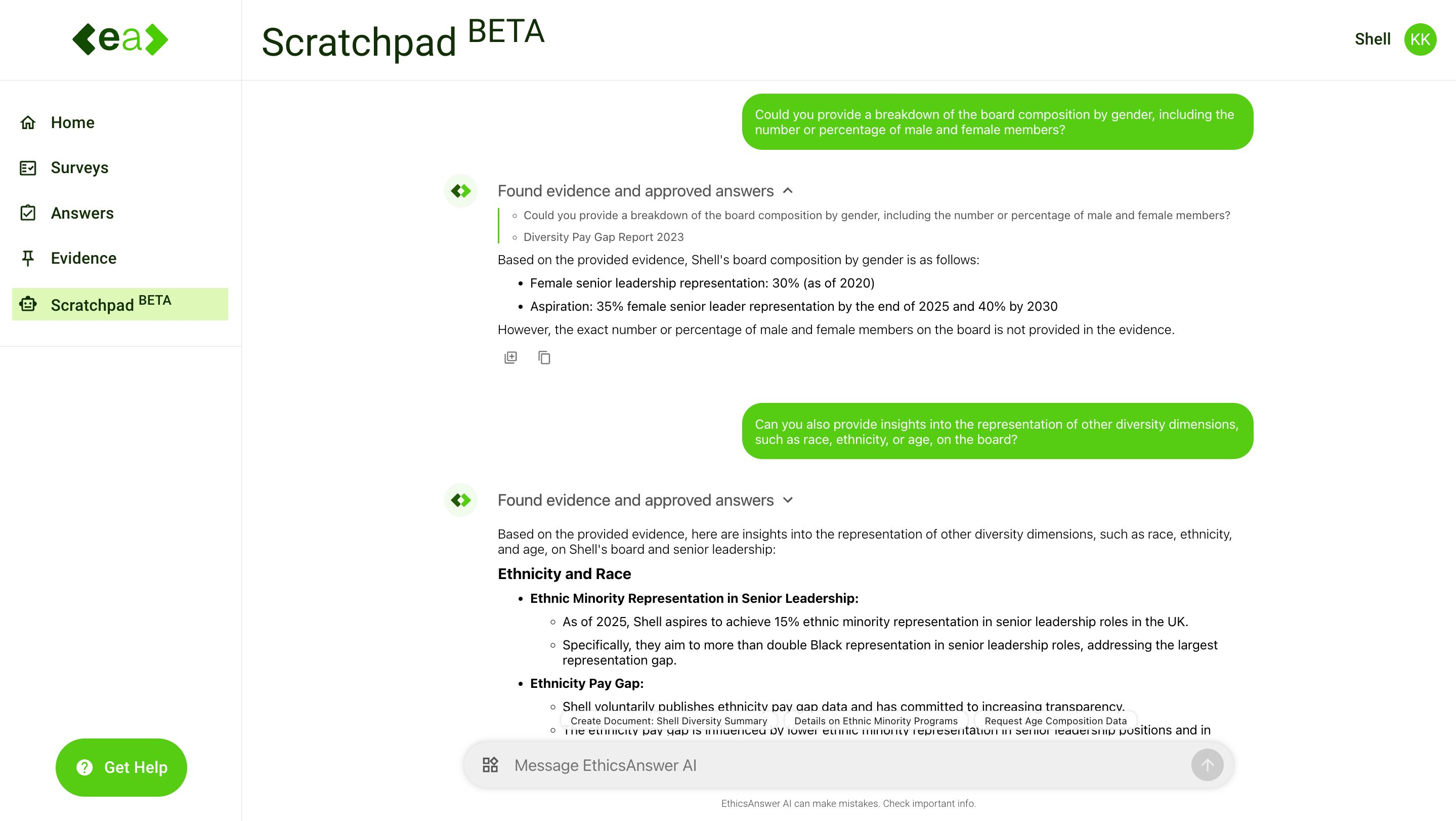
EAglobal
EAglobal is the latest 'partner venture' to have adopted LettsGroup's AI VentureFactory to help it scale-up more efficiently than otherwise possible, which is important given the considerable market interest for its form-filling AI platform that completes diligence questionnaire's (DDQs) regardless of format. The team is led by the ex-head of AI at Fidelity. This UK-based agentic AI company offers its solution to B2B companies receiving DDQ questionnaires from their customers - including ESG disclosures. We're excited to welcome EAglobal to the growing network of LettsGroup ventures - delivering higher venture success rates and better returns.
Other LettsGroup Ventures
We highlight a few of our ventures in each monthly edition of The LettsGroup NewsFlash. To explore other LettsGroup ventures go to LettsGroup/ventures.
The likes of Paul Graham from Y Combinator and Brian Chesky of Airbnb swear by 'Founder Mode'. It's a friendly way to say that corporate managers are crap and founders should trust their control freakish tendencies. After all, it did wonders for Steve Jobs.
At the moment details are a little sketchy other than 'ditch the corporate mumbo-jumbo jargon folk'! You know, the empty suits with Adidas Campus sneakers - and manage from the middle (we added that) with tonnes of reports and control. Do what your gut tells you, just not the Sam Bankman-Fried kinda gut.
The Mafia have apparently been practising 'Founder Mode' for ages. They call it 'keeping it in the family'...

This cartoon first appeared at The Letts Journal.
LettsGroup HQ
A month after LettsGroup launched its AI VentureFactory to a wider audience it has already started onboarding 3rd party ventures. Its hybrid-AI approach, its software suite for early stage tech-driven companies and the approach to co-piloted 'startup intelligence' is clearly appealing. LettsGroup is excited to bring its unique approach to system-driven scaling and automated demand creation to more entrepreneurs. A number of entrepreneurs and investors have registered , even while the AI VentureFactory is in limited release. From a technology perspective the team has been developing automated connectors between widgets, processes, commands and end-apps to further extend its AI driven automation. Watch this space.
LettsCore
As LettsCore starts the planning to onboard its 2nd corporate customer, the Media-as-a-Service platform has been busy extending its technology further, including organisational management - invite / edit / remove users to organisations, plus adding content atom pricing support for media owners, enabling a single billing account to manage the purchase of content by any user within the organisation. This functionality includes the full range of pricing/monetisation options, with perpetual and per-use based pricing fully integrated to the user's wallet. The team has been researching auto-distribution of NFT content directly into NFT market places. Magic Eden and OpenSea will be first up. Also, LettsCore's web based customer onboarding system is nearing completion for wider roll-out in Q1 2025.
Buy your holiday gifts from LettsGroup ventures: get great art with LettsArt . Subscribe to LettsSafari to get your wild on (once a member you can also gift subscriptions). And now's the time to book your 2025 eco-estate retreat at LettsRetreat . If you're feeling a bit broke after all that subscribe to The Letts Journal - it's FREE!

LettsNews
LettsNews has nearly completed V1 ready for full beta release in January. The team have worked hard to complete the functionality necessary to get its simple, yet powerful newsroom tech to freelancers and SME's, with software that automates the process from news gathering, story development, tagging, search, virtual team collaboration and approvals through to filing, publishing, archiving and auto news distribution. The roadmap for V2 has been mapped out, to include AI news creation, tagging, AI connectors, advanced search, AI 'Content Item' suggestions, an enterprise subscription plan and a groundbreaking news item marketplace. Users can register for LettsNews beta release with its web app synced to the mobile app to be released on the Google Play Store and App Store by January.
LettsArt
LettsArt had a stellar month in November, with 2 new art galleries a day signing up to its no-code AI software platform (just 12 months after its soft launch). LettsArt is heading towards 800 artists and gallerists using its software to manage, distribute and sell art. Early subscription and transaction revenues are shaping and the art available at galleries using LettsArt is increasingly diverse and appealing - with multiple price points. Its nearly 2,500 users are becoming a valuable engine for viral, organic growth enabling LettsArt to scale efficiently. Hundreds of artworks were added to LettsArt galleries last week alone. In early 2025 LettsArt will deliver auto-distribution of NFTart from its dashboard to other leading NFT marketplaces. It has become the most advanced software to fully support any kinds of art - both physical and digital.

LettsSafari & LettsRetreat
LettsSafari has just kicked off its first digital advertising campaign for climate enthusiasts to subscribe to its platform. Being National Tree Week, LettsSafari has been running a series to educate its subscribers about planting and nurturing trees for wildlife. Next week the team will spend 4 days in its parks planting out new trees - a mix of deciduous 5 year old trees grown in designated areas in LettsSafari parks using their rewilding system. Meanwhile, LettsRetreat is gearing up for a busy Christmas and early bookings for company retreats and stays in 2025.
Other LettsGroup Ventures
We highlight a few of our ventures in each monthly edition of The LettsGroup NewsFlash. To explore other LettsGroup ventures go to LettsGroup/ventures.
Here are the top 5 ways that LettsArt's AI can help you better show and sell art online:
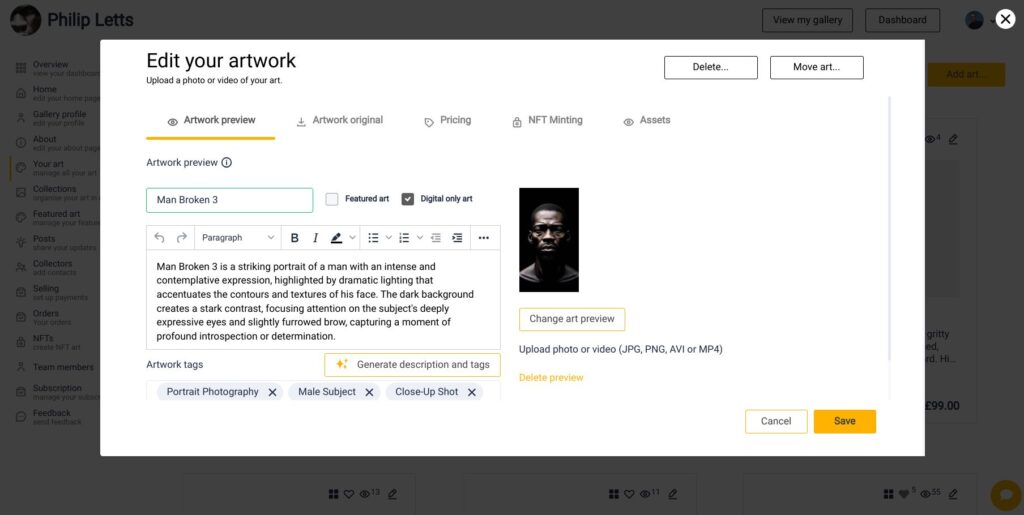
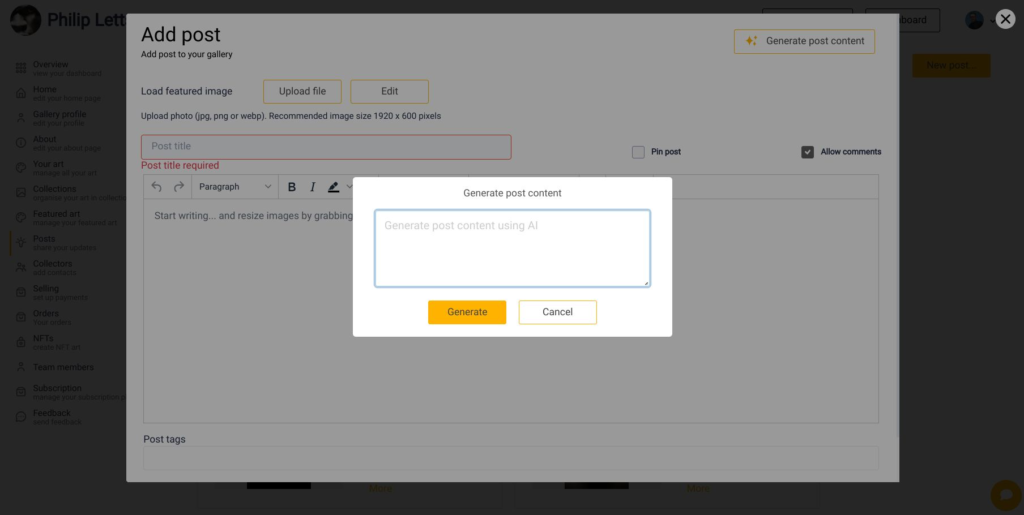
LettsArt's no-code software enables any artist, gallerist or art dealer to better show and sell art online. LettsArt AI gives you the extra edge - delivering 'art intelligence'.
To sign up to LettsArt go to www.LettsArt.com.
LettsGroup HQ
In October LettsGroup's AI VentureFactory was offered in limited release to select 3rd party startups, scale-ups and corporate incubators. Already utilised by LettsGroup's own branded ventures, the AI VentureFactory is now ready to co-pilot outside companies. Its startup methodology, venture building tools and processes, are proven over many years and with multiple tech-driven startups. It can transform both innovation delivery and financing - doubling venture success rates while considerably enhancing returns. Businesses beyond Seed investment and venture backers can register at https://letts.group/register/. Also this month the team has been expanding its software suite with investor management and comms capabilities. Next up is transactional extensions which will provide interesting new opportunities for entrepreneurs and investors.
LettsCore
LettsCore's tech team have been working on its content monetisation and customer subscription system as it moves to wider commercial release, developing subscription plans (partnering with Stripe), and setting pricing contracts for each piece of content - both perpetual licenses and pay per view contracts. These are working nicely - particularly pay per view which decrements wallet balances in real time as content is viewed. This opens up opportunities for content owners and creators to offer their content to AI LLM learning engines, that can be charged each time the content is utilised in the learning process. November will be finalising the UX flow for the SaaS front end and developing the approach to NFT auto-distribution onto 3rd party marketplaces. At the same time, LettsCore's first corporate customer is expanding its roll-out while the blockchain-based distributed media platform is getting ready to onboard its second corporate customer.
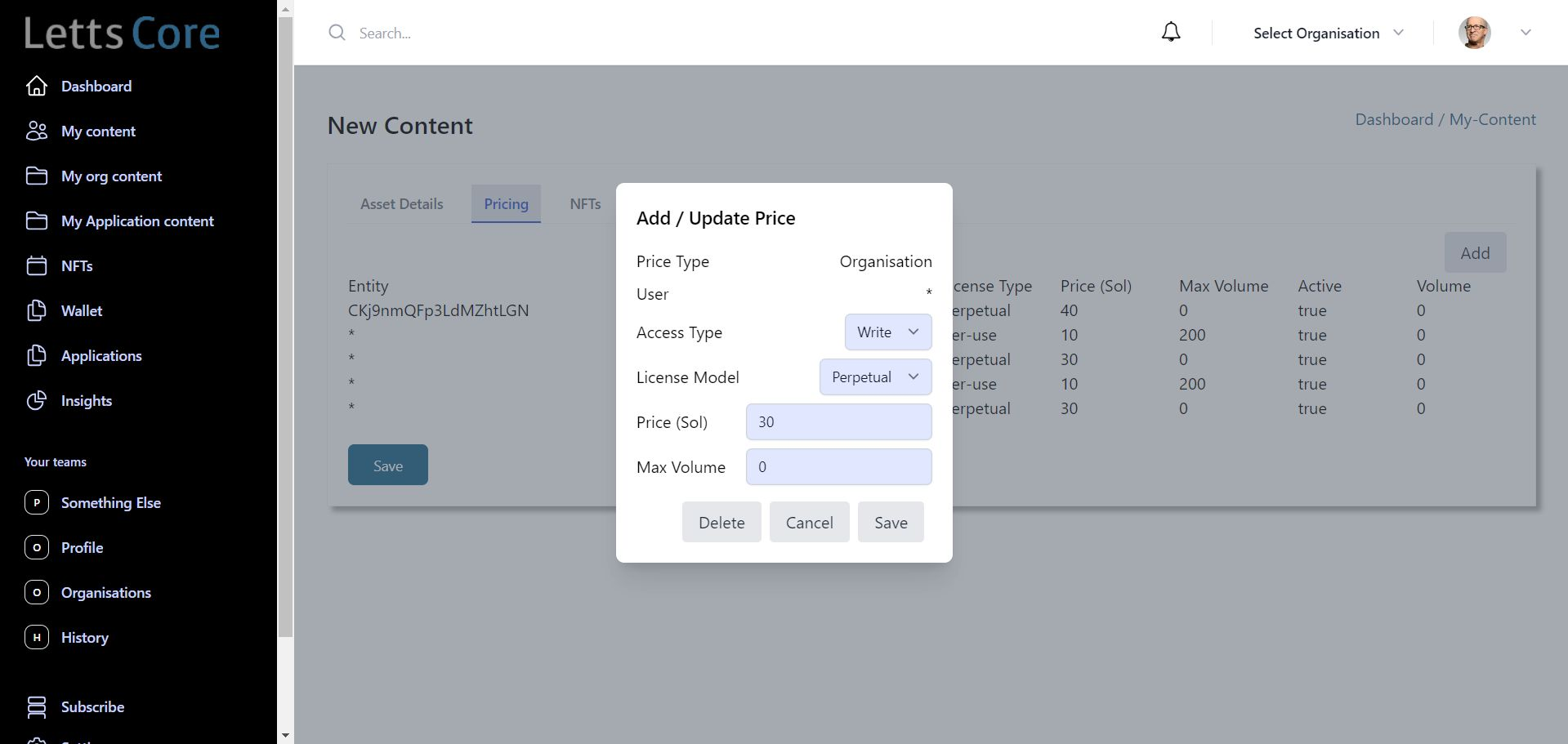
LettsNews
LettsNews is also busy readying for wider beta release to targeted journalists, corporate comms and PR firms. The team is getting its mobile app ready for wider release into the Google Play and Apple App stores while enhancing the web app. Over the last 6 months the private beta has delivered enough feedback to build a robust commercial V1 offering earlier than expected. The way in which LettsNews handles the news content process from gathering news, to publishing and auto-distribution is both highly efficient and innovative. The Team functionality links this process from corporate content managers to PR's and selected journalists and news publishers which can drive significant efficiencies across the industry. The next leg of the product to V2 will deliver AI enhancements and content monetisation with a news item content store. The combination could prove to be quite pivotal for its users.
LettsArt
LettsArt has approaching 700 art and artist galleries using its no-code AI platform with over 2,000 users in total. Various enhancements across its AI capabilities and art community features mean that LettsArt V2 is now ready for prime time - going from startup to scale-up and into Stage 4 of LettsGroup's venture building methodology Innov@te. In preparation, LettsArt has developed an algorithm to highlight some of its featured gallery users and is also readying for a mixed-gallery display of featured art from some of its leading gallery customers.
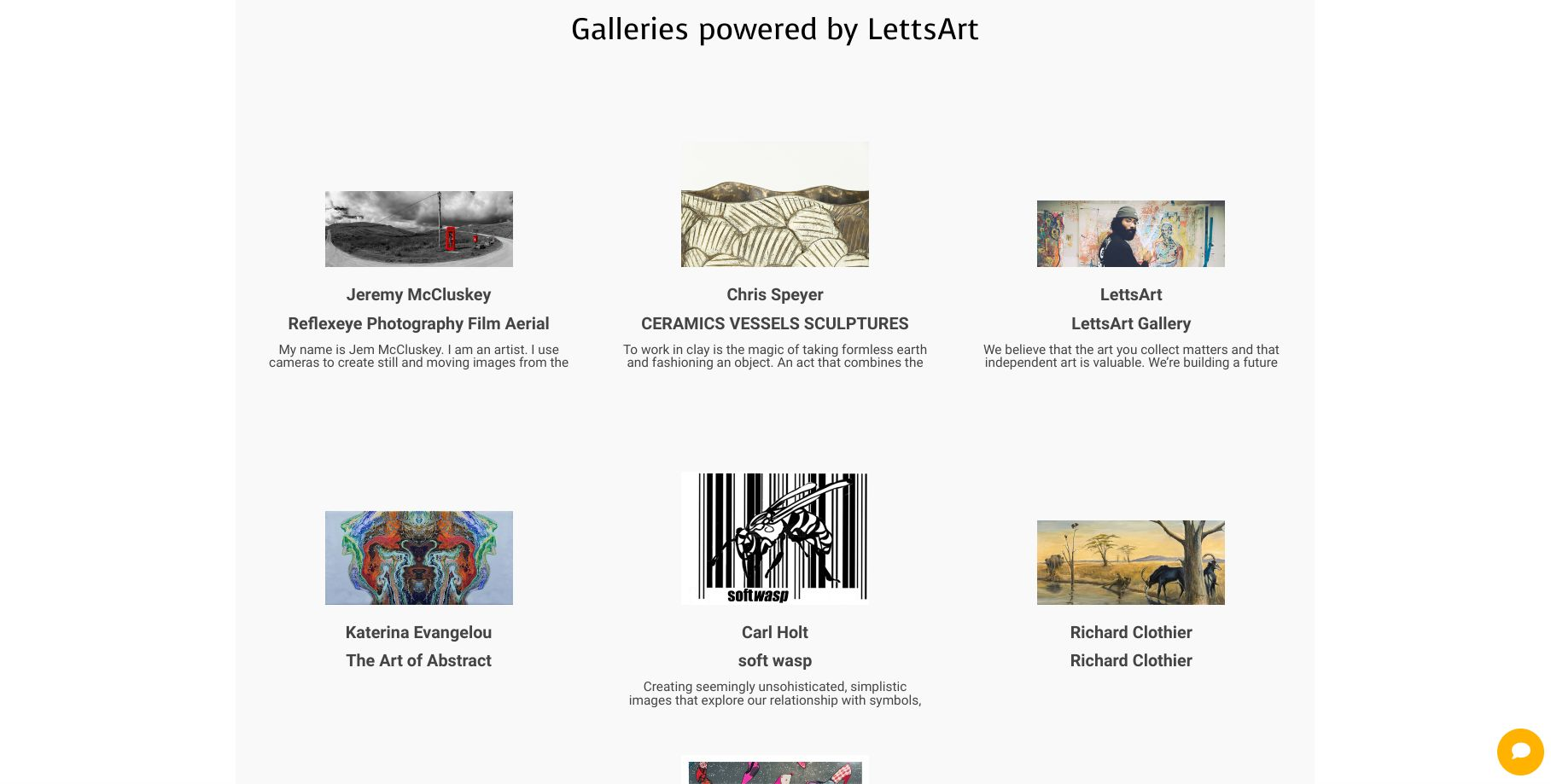
LettsSafari and LettsRetreat
LettsGroup's two emerging eco ventures have made solid strides in October. LettsSafari has just kicked off its first digital ad campaign expanding its paid subscribers and commercial KPI's in advance of wider market expansion later in 2025. It has started working with Wimbledon Park, amongst others, to develop a network for historic tree seed banks across the UK with other well known parks. LettsRetreat has just launched an innovative subscription membership programme ideally suited for organisations interested in eco retreats for their teams and as incentives for top performing employees. Members can subscribe to eco retreat stays for 5 days a year for teams up to 14 people at just £399 per month - find out more here.
Other LettsGroup Ventures
We highlight a few of our ventures in each monthly edition of The LettsGroup NewsFlash. To explore other LettsGroup ventures go to LettsGroup/ventures.
LettsGroup and its AI-driven VentureFactory are uniquely positioned to help startups, scale-ups, venture capitalists and corporate venture firms build tech-driven ventures with better success rates and financial returns. By utilising advanced technology and proven methodologies, LettsGroup provides an innovative approach to venture building that addresses the high failure rates and inconsistent returns typical in the startup ecosystem. They call it "startup intelligence".
Already utilised by its own branded ventures, the AI VentureFactory is now available to co-pilot other technology-driven startups, scale-ups, venture capital firms and corporate venture groups. It has been initially launched in limited release to select 3rd party ventures. LettsGroup's AI VentureFactory, its startup methodology and venture building tools and processes are proven over many years and with multiple successful technology, media and climate ventures.
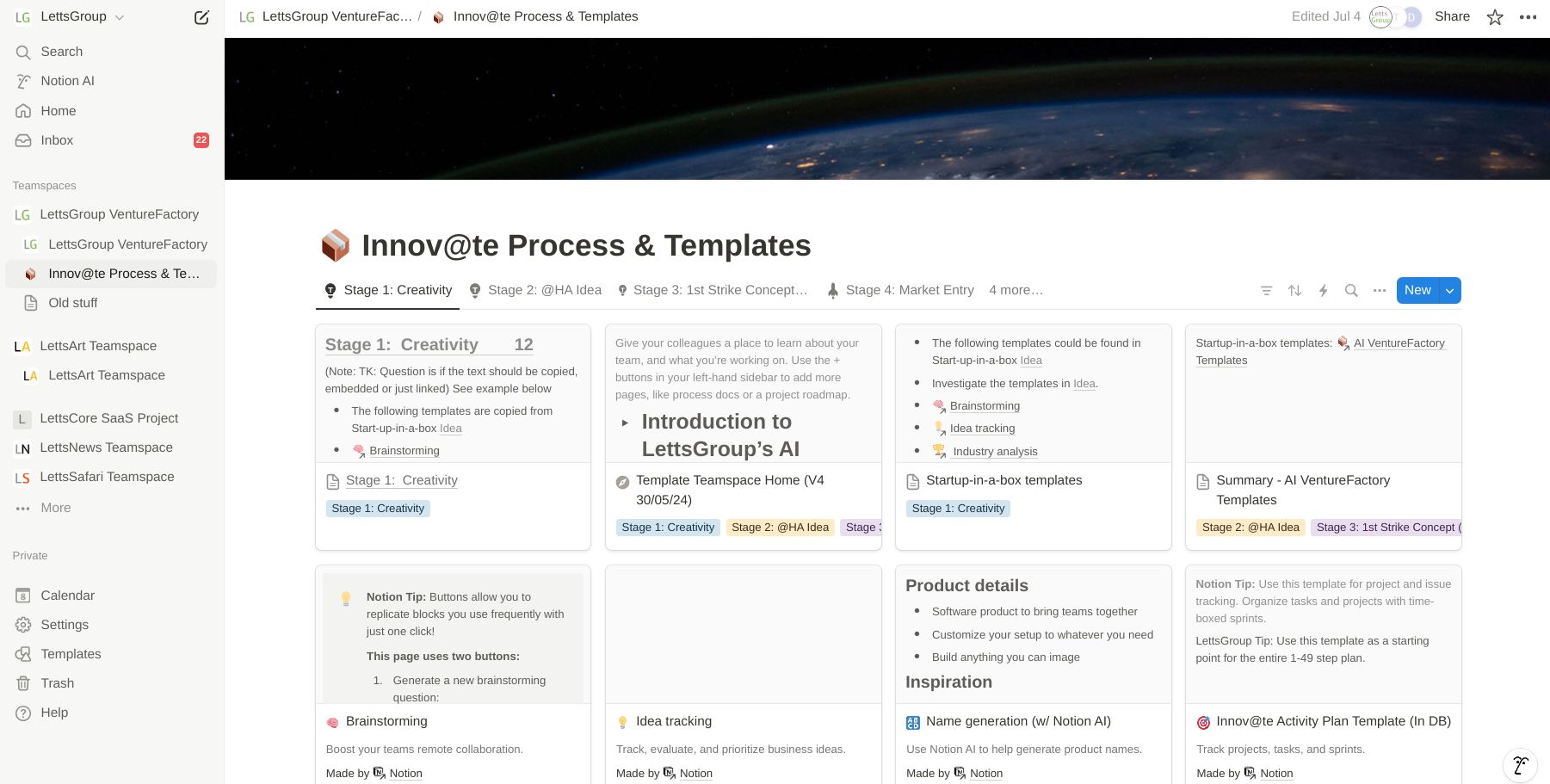
At the core of LettsGroup's success is their proprietary Innov@te™ methodology, which uses a customer-centric approach to ensure ventures are closely aligned with market needs. This systematic approach, combined with a seven-stage venture-building process, helps ventures progress from idea to exit while minimising risks and costs. With 49 steps and hundreds of sub-steps, the process covers every detail of venture development, significantly improving the chances of success.
Additionally, the AI VentureFactory incorporates AI tools and automation to enhance every phase of venture building, from product development to market scaling. By using AI, LettsGroup reduces costs, accelerates growth, and increases the quality of ventures built. This platform supports entrepreneurs and investors by providing a structured, repeatable system that has proven effective across industries like software (including Cloud and SaaS), fintech, mediatech, and climate tech. LettsGroup's AI VentureFactory and its supporting programme, powered by a suite of apps, templates and tools also accelerates innovation financing.
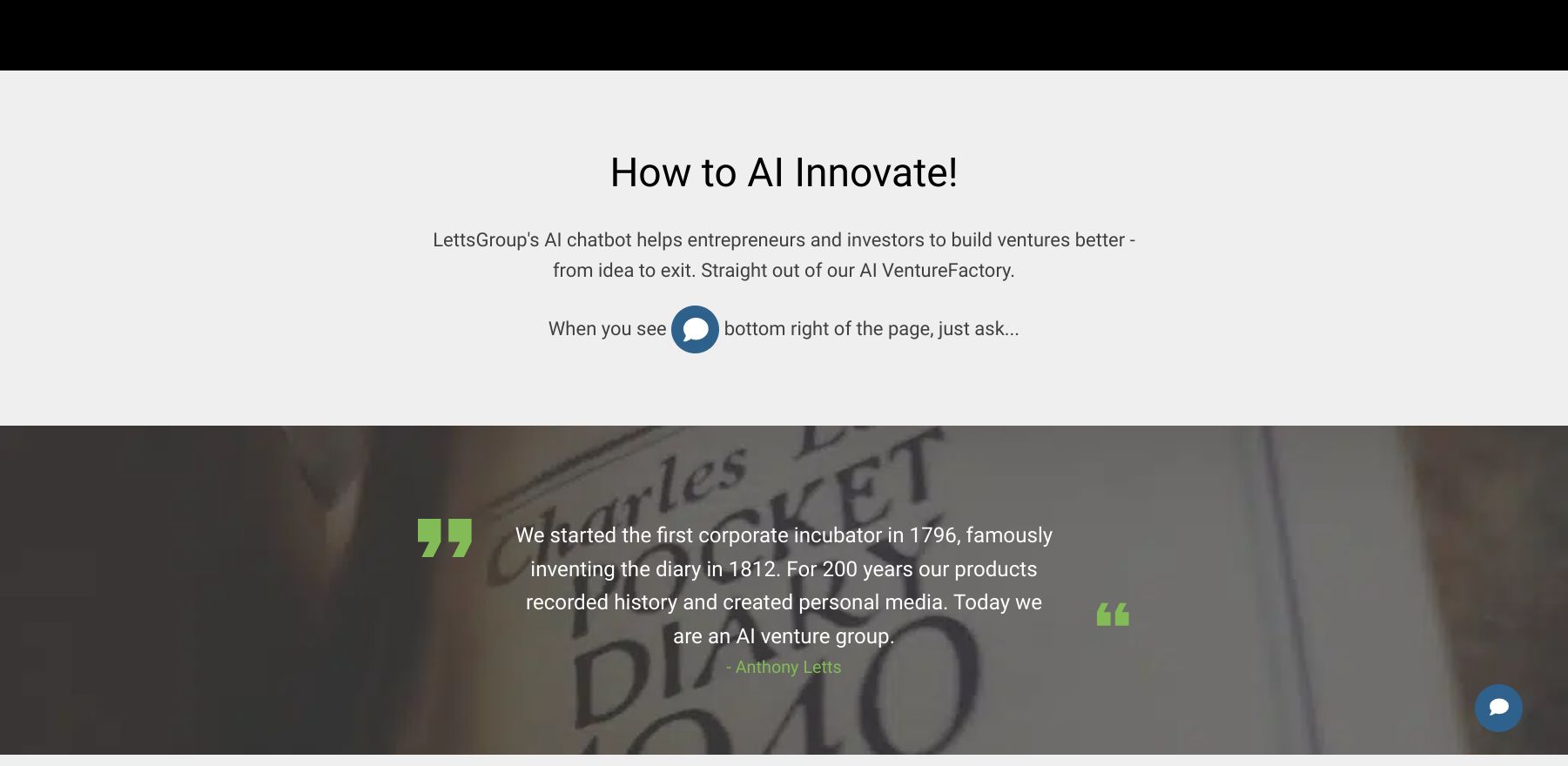
In addition, everyone is invited to use the new AI chatbot for entrepreneurs and investors , designed to assist with everything from idea validation to financial planning. This startup intelligence tool leverages LettsGroup's extensive venture experience, offering real-time insights and tailored advice to streamline decision-making processes. For venture capitalists, this innovation AI chatbot helps them to get under the skin of venture building and evaluate new opportunities, adding significant value to investment strategies. Find it at www.Letts.Group.
LettsGroup’s AI VentureFactory goes further enabling startups to scale efficiently, while also providing corporate venture firms and VCs with a more reliable path to higher returns. Its integration of hybrid AI, combined with its deep industry expertise, positions LettsGroup as a leader in venture innovation, financing and startup intelligence, making them a vital partner for those looking to navigate the complexities of building successful ventures in today's fast-paced market.
From today tech-driven startups beyond Seed financing can register for LettsGroup's AI VentureFactory pogramme to co-pilot them from startup to successful scale-up, delivering unparalleled startup intelligence, at LettsGroup/VentureFactory.
September was spent extending LettsGroup's AI VentureFactory with new investor management capabilities adding automated investor marketing, communications and CRM. As a result we have integrated LettsNews, as the core investor communications system and Hubspot for investor email marketing and CRM, into the VentureFactory's AI software suite. It's similar to Oracle apps but for startup businesses and investors. We have also been busy behind the scenes getting ready to launch an 'innovation' AI Chatbot for entrepreneurs and investors which goes live in October. In the next months LettsGroup will be adding some impressive new team members.
This month LettsCore has continued to focus on optimising system performance essential to its core technical USP of concurrently linking and managing content, creators, owners, organisations and applications at massive scale with lower compute costs . The engineering team has implemented a sophisticated asynchronous write module which delivers fast scalable write performance, along with optimised caching for blazing read performance. These changes have been tested with our first corporate customer outperforming its instance of Google Firebase on both read and write tasks. Development is continuing on the SaaS dashboard for this groundbreaking new distributed media management platform with the team starting to build wallet management elements to enable LettsCore users to view their transactions in their wallet, port their own wallet into LettsCore, and transact initially on the Solana blockchain - sending Sol, as example, to another wallet.
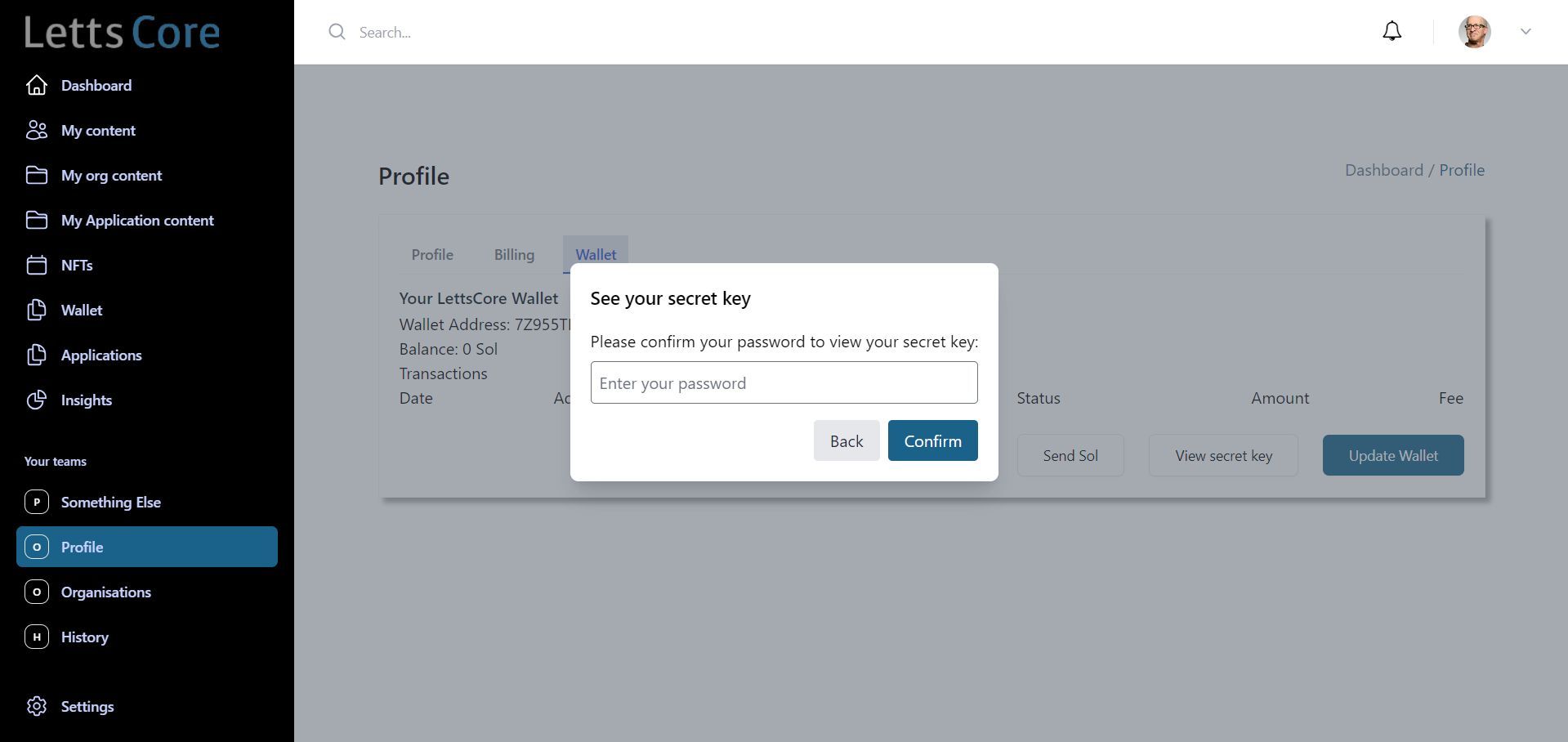
LettsNews has also been focused on performance and optimising speed from news gathering to publishing, distribution and revenues. Indeed, the team believes that its software can cut cycle times and increase efficiency many times beyond what is currently available in the news publishing space - all while providing rapid team sharing and review, sign off and distribution to multiple news outlets and digital media sites. Indeed this NewsFlash went from creation to publishing and distribution across numerous media and email newsletters with just 3 clicks. LettsNews is currently working on company subscriptions to go beyond its freelance and single user plan for journalists, PR's and content managers.
LettsArt's no-code AI software now powers 626 art and artist galleries plus approaching 1,400 art collectors. Thousands of artworks have been uploaded with many more added on a daily basis. With LettsArt V2 fully released artists are using its AI more widely, principally to generate curator quality descriptions and tags for their art. New community features are going down well, with gallerists and artists communicating better with their followers and collectors. LettsArt's Post feature with auto-generated email newsletters is also proving popular. LettsArt's users are increasingly depending on its subscription software to sell art better. The team are currently working on extending auto-distribution to include 3rd party art marketplaces which would be an industry first.
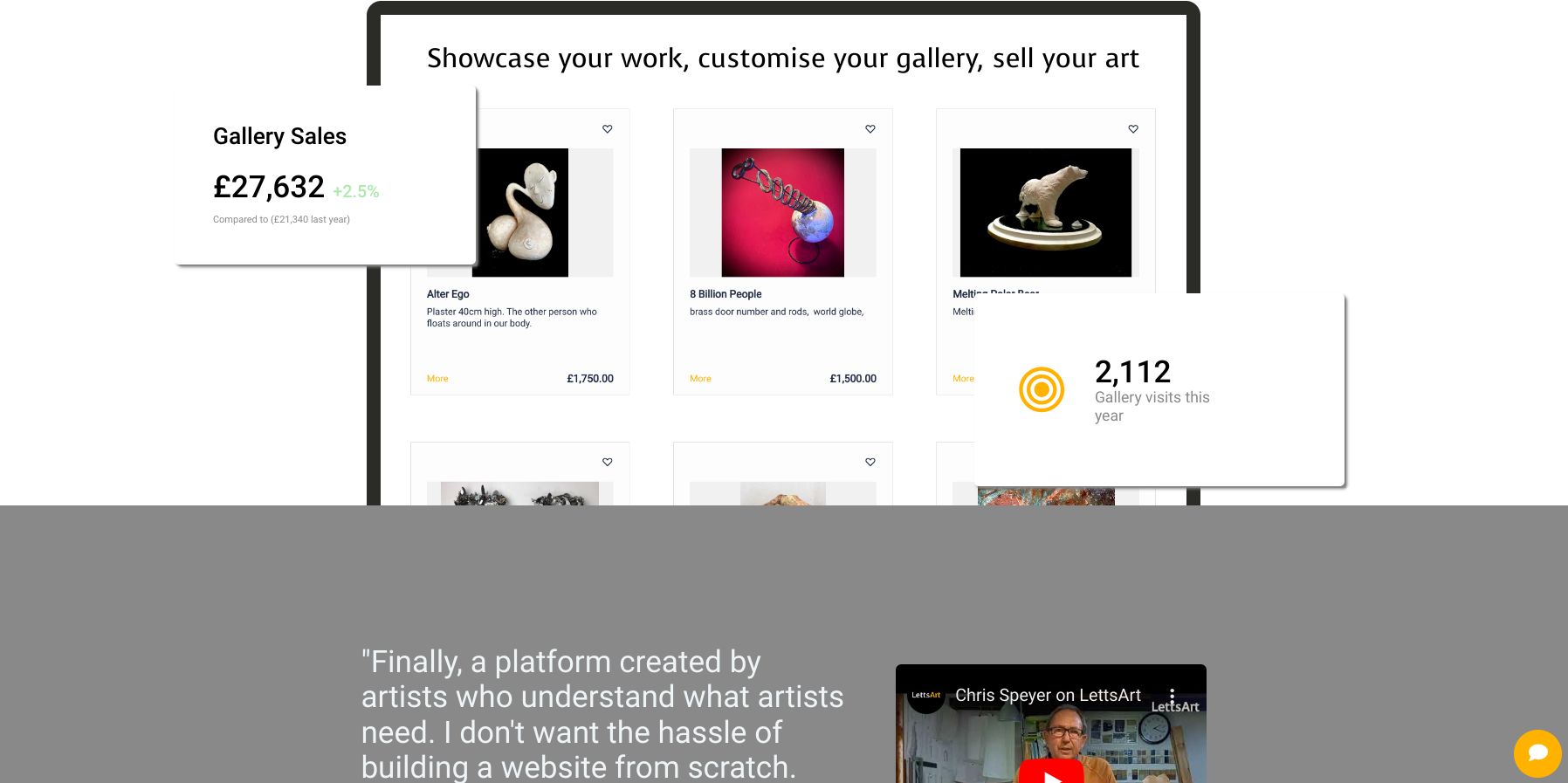
LettsSafari inspired us all last week with its announcement about endangered water voles thriving across its rewilding safari parks. Their fascinating approach to smaller-scale rewilding, delivering private safari parks and gardens en masse, was brought to life by this successful conservation project in a small setting with one of the UK's most recognised wildlife breeders. It's interesting to note that biodiversity and wildlife trends delivered at LettsSafari parks seem to find their way into the wider conscience including venues like the Chelsea Flower Show just a few years later. LettsSafari is becoming a living lab for biodiversity solutions and rewilding techniques. Its subscription-based digital platform is proving quite an innovation in itself. LettsSafari.com starts its UK wide digital ad campaign to climate enthusiasts from next month.
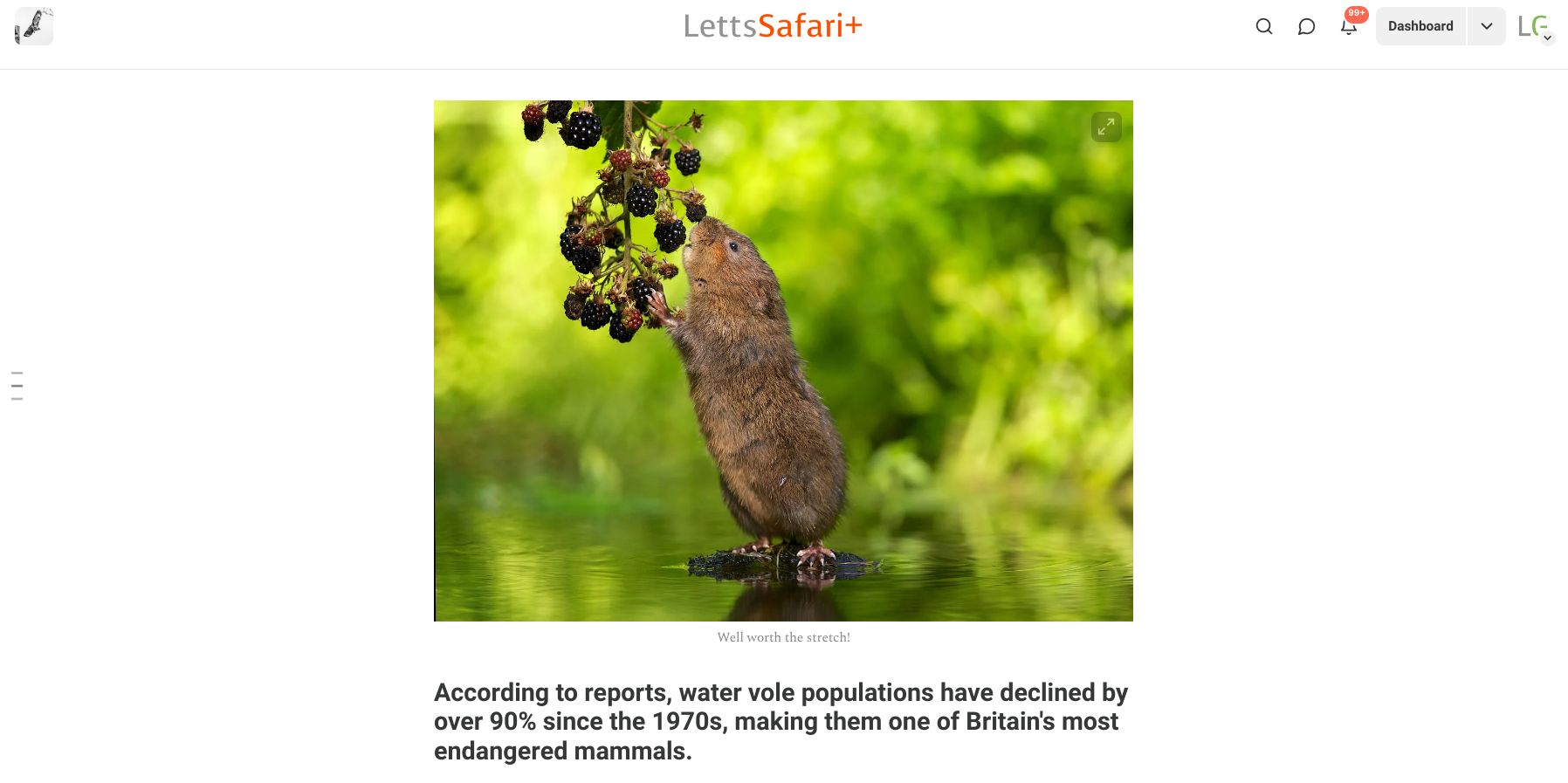
Talking of subscription economy innovations LettsRetreat launched a compelling subscription offering for its members. The membership plan gives exclusive access to an entire eco estate for 5 days a year. Kind of like Soho House but in the wild. An initiative designed for families, friends and teams to retreat. Their approach to blending historic architecture, eco surroundings and open-air art seems ideally designed for long weekend breaks and team retreats.
We highlight a few of our ventures in each monthly edition of The LettsGroup NewsFlash. To explore other LettsGroup ventures go to LettsGroup/ventures.